In this article:
As the natural process of aging happens, loss of collagen and structural integrity of the skin ensues, leading to the formation of wrinkles also known as rhytids.
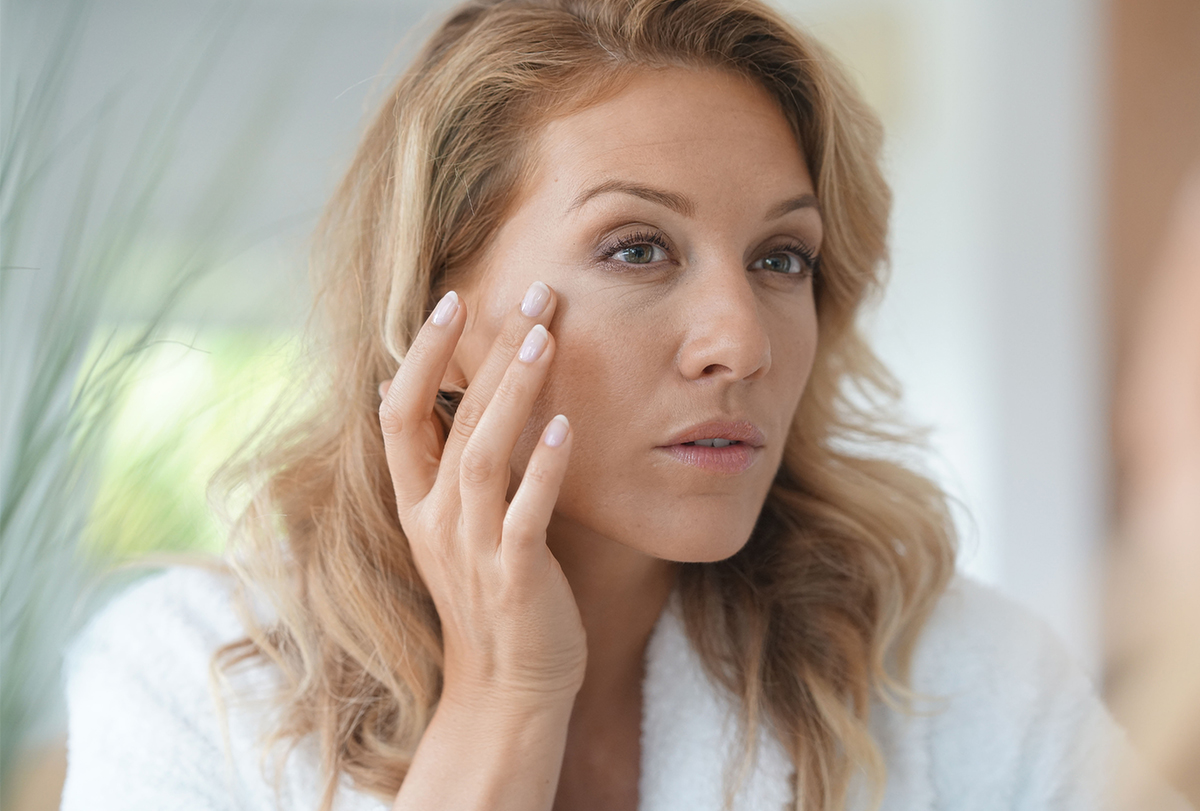
Wrinkles can be dynamic, when they exaggerate on expressions, or static, when they constantly present as stationary fine lines or deep furrows. Wrinkles are often associated with sagging of the skin as well, especially on the neck and face. These wrinkles form as the fibroblast in the skin undergo changes as you age.
As a result, the production of collagen and elastin is decreased. The existing collagen and elastin proteins also begin to break, resulting in a weak structural matrix of the skin.
In addition, repositioning of fat occurs, which can be seen as sagging around the jawline, cheeks, and brows. While this is normal with old age, some people develop wrinkles early in their life, known as premature aging, which can occur due to various factors.
The good news is various treatments and self-care measures can help reduce the appearance of wrinkles and delay their formation in the first place.
Causes of Wrinkles
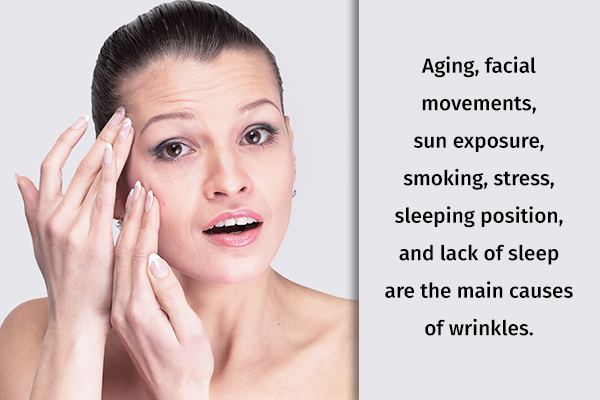
Several factors contribute to the formation of wrinkles, including:
- Aging: As mentioned above, your skin develops wrinkles with age as the collagen and elastin fibers degrade.
- Facial movements: Different expressions, such as laughing, frowning, and yawning repeatedly, cause the facial muscles to contract, forming dynamic wrinkles in between the muscle fibers.
- Sun exposure: Prolonged, repetitive exposure to the sun’s harmful UV rays can damage the structural components of the skin, resulting in premature aging, textural changes, and fine lines.
- Smoking: Smoking is highly deleterious to health as it increases the concentration of free radicals in the body. These free radicals can damage the skin and are a common cause of premature skin aging. Moreover, the constant puckering of lips during smoking can lead to lines around the mouth called “smokers lines.”
- Stress: Stress increases cortisol levels in the body, in turn speeding up the aging process and causing deep wrinkles to appear.
- Sleeping position: The way you sleep affects your facial skin to a great extent. When your sleeping position puts pressure or compresses the skin, wrinkles are more likely to appear.
- Lack of sleep: A lack of sleep can affect your skin health by altering the skin pH and lowering the ability of skin cells to retain moisture, therefore increasing the chances of developing wrinkles.
Treatment for Wrinkles
The following treatment modalities can help fade wrinkles:
OTC products
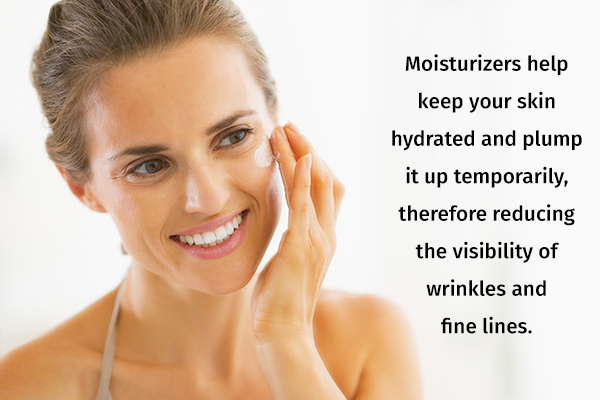
You can try the following over-the-counter creams and products to help improve wrinkles:
- Moisturizers help keep your skin hydrated and plump it up temporarily, therefore reducing the visibility of wrinkles and fine lines.
- Hyaluronic acid serums provide long-term skin hydration by helping water molecules bind with collagen, hence making the skin soft and supple and therefore decreasing the appearance of wrinkles.
- Alpha hydroxy acids can help in resurfacing the skin and hence reducing fine lines and improving overall skin texture. (1)
- Oral collagen supplements aid in improving skin hydration, elasticity, and dermal collagen density, (2) therefore helping prevent and fade wrinkles to a large extent. Consult your doctor on the use of collagen supplements.
Serums
The following compounds, available as serums, can be beneficial for your skin in terms of managing wrinkles:
- Retinol: Retinol is derived from vitamin A, and retinol serums help fade fine lines and wrinkles, even out skin tone, shrink pores, and improve skin texture. The use of topical retinol for improving wrinkles has been proven in clinical trials. (3)
- Peptide: Peptides are proteins, and peptide-containing serums are readily absorbed by the skin, boosting the production of collagen and elastin, therefore delaying and managing wrinkles.
- Vitamin C and ferulic acid: Serums containing vitamin C and ferulic acid help combat free radicals, therefore preventing the formation of wrinkles caused by oxidative damage to the skin.
Injections
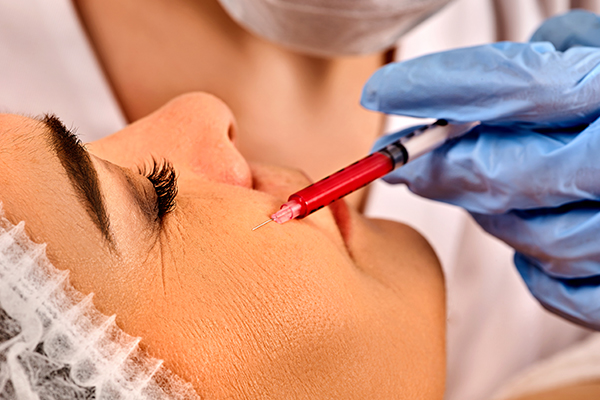
You can also consult your doctor on the use of injectable materials that plump up the skin, giving your skin a fuller appearance and reducing wrinkles. These injection treatments include:
- Botulinum toxin (Botox©): Directly injected into the skin, Botox relaxes the muscles and thereby treats wrinkles for a few months. (4)
- Dermal fillers: You can get fillers that can boost collagen production in your skin, commonly called skin boosters. Fillers can also add volume to the face to contour it for a fuller, youthful appearance.
- Thread lifts: In this nonsurgical facelift procedure, dissolvable threads are used to pull up sagging areas of the face and reposition it by tightening the skin. (5)
Other nonsurgical treatments
In some cases, your doctor may suggest the following medical procedures:
- Radiofrequency treatments: Low-energy radiofrequency waves are used to boost the formation of collagen and elastin in the skin, therefore helping fade wrinkles and fine lines. (6)
- LED phototherapy: Another light energy-based treatment, LED phototherapy stimulates skin repair and renewal. When used with a photosensitizer, it can also rejuvenate the skin. (7)
- Laser skin resurfacing: This procedure is especially useful in treating deep wrinkles by boosting collagen formation. (8) It is usually done to lift the wrinkles around the eyes, mouth, and forehead.
- Retinol yellow peel: A retinol superficial peel is done to smoothen the skin texture and provide antiaging effects. When performed by an expert, this treatment can be highly efficacious in improving fine lines and resurfacing the skin. (9)
Surgical treatments
You can also opt for facelift surgery to eliminate skin sagging and wrinkles, giving you a more youthful appearance. Also known as rhytidectomy, this surgical procedure helps reverse the skin’s anatomical changes caused by aging. (10)
Lifestyle Changes to Reduce Wrinkles
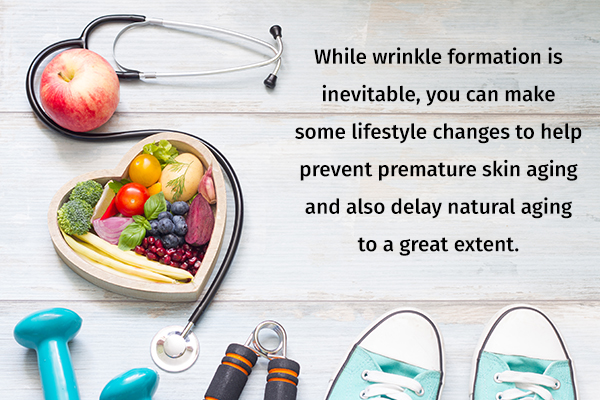
Wrinkle formation is inevitable, but you can implement lifestyle changes to prevent premature skin aging and also delay natural aging to a great extent. These measures include:
1. Keep your skin moisturized
Skin hydration and moisturization are vital to prevent wrinkle formation. Make sure to apply a moisturizer after you take a shower or every time your skin feels dry, especially in the dry winter months.
2. Protect your skin from sunlight
Sunlight exposure can cause photoaging by increasing oxidative stress in the body. It is suggested to apply a broad-spectrum sunscreen with SPF 30 or higher every day.
Wear protective clothing and sunglasses to shield your skin from harsh sun rays. Moreover, avoid going out in the sun whenever possible, especially during the daytime.
3. Improve your diet
Increase your consumption of antioxidant-rich foods such as fruits and vegetables as antioxidants help prevent collagen breakdown. On the other hand, high-fat and processed foods damage skin cells, leading to the formation of wrinkles.
4. Consume plenty of water
Drink at least 2 liters of water every day to keep your skin hydrated and supple from within.
5. Get adequate sleep
Proper sleep allows your skin to repair and renew overnight, helping prevent wrinkle formation. It also is best to sleep on your back to avoid compression of your facial skin overnight.
6. Exercise daily
Regular exercise can help slow down the natural aging process and therefore contribute to wrinkle management. You can perform high-intensity interval training, swimming, running, or other cardio exercises for the same.
7. Refrain from smoking or consuming alcohol
As mentioned above, smoking damages the collagen tissues in your skin. Alcohol, on the other hand, can cause skin dehydration and contribute to wrinkle formation. Therefore, it is best to avoid smoking and limit your alcohol intake.
Most-Asked Questions About Wrinkles
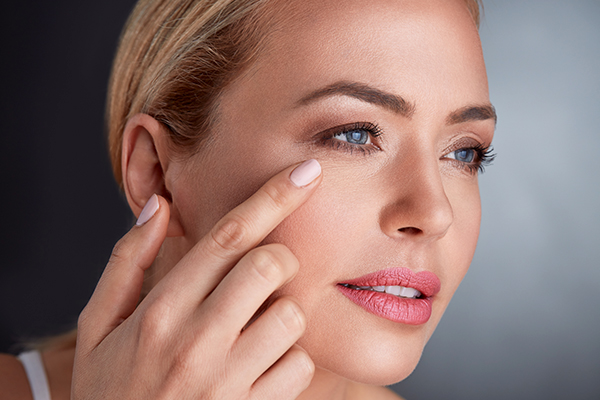
Can castor oil help in the treatment of wrinkles?
The use of castor oil for the treatment of wrinkles is merely based on anecdotal evidence and is not supported by any scientific study. Instead, castor oil can potentially cause skin irritation, especially in people with sensitive skin or skin problems such as dermatitis.
Do cosmetic injections have side effects?
While cosmetic injections such as botulinum toxin (Botox) are generally safe, they may show side effects in a few individuals. Therefore, make sure you get cosmetic procedures done in reputable centers and know the potential side effects of these treatments.
When to See a Doctor
It is suggested to book a consultation with your dermatologist if you notice the appearance of wrinkles on your skin at a young age or if the appearance of wrinkles on your face is an aesthetic concern for you.
Final Word
Wrinkles refer to the lines and folds that appear on the skin with age. This happens because the fibroblast cells lose their efficacy of collagen and elastin production over time.
While wrinkles cannot be prevented completely, you can delay their formation and avoid premature skin aging. For this, it is essential to know the factors that contribute to skin aging and make lifestyle changes to manage them. Several medical treatments are also available to slow skin aging and fade existing wrinkles to a certain extent.
- Was this article helpful?
- YES, THANKS!NOT REALLY


